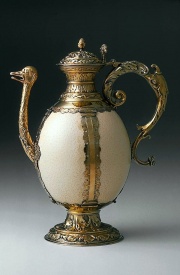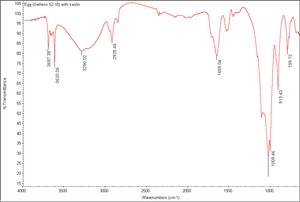Difference between revisions of "Egg"
| (One intermediate revision by the same user not shown) | |||
| Line 1: | Line 1: | ||
| − | [[File:63.1257-141-12.jpg|thumb|]] | + | [[File:63.1257-141-12.jpg|thumb|Ostrich egg ewer<br>MFA# 63.1257]] |
== Description == | == Description == | ||
| Line 11: | Line 11: | ||
== Physical and Chemical Properties == | == Physical and Chemical Properties == | ||
| − | Miscible with water when fresh. Insoluble in water after heating. | + | * Miscible with water when fresh. |
| + | * Insoluble in water after heating. | ||
== Resources and Citations == | == Resources and Citations == | ||
* R. J. Gettens, G.L. Stout, ''Painting Materials, A Short Encyclopaedia'', Dover Publications, New York, 1966 | * R. J. Gettens, G.L. Stout, ''Painting Materials, A Short Encyclopaedia'', Dover Publications, New York, 1966 | ||
| − | |||
* Ralph Mayer, ''A Dictionary of Art Terms and Techniques'', Harper and Row Publishers, New York, 1969 (also 1945 printing) | * Ralph Mayer, ''A Dictionary of Art Terms and Techniques'', Harper and Row Publishers, New York, 1969 (also 1945 printing) | ||
| − | |||
* John S. Mills, Raymond White, ''The Organic Chemistry of Museum Objects'', Butterworth Heineman, London, 2nd ed., 1994 | * John S. Mills, Raymond White, ''The Organic Chemistry of Museum Objects'', Butterworth Heineman, London, 2nd ed., 1994 | ||
| − | + | * Wikipedia: [https://en.wikipedia.org/wiki/Bird_egg Bird Egg] (Accessed Nov. 2, 2005 and March 2025) | |
| − | * Wikipedia: | ||
| − | |||
* ''Van Nostrand's Scientific Encyclopedia'', Douglas M. Considine (ed.), Van Nostrand Reinhold, New York, 1976 | * ''Van Nostrand's Scientific Encyclopedia'', Douglas M. Considine (ed.), Van Nostrand Reinhold, New York, 1976 | ||
| − | |||
* ''The American Heritage Dictionary'' or ''Encarta'', via Microsoft Bookshelf 98, Microsoft Corp., 1998 | * ''The American Heritage Dictionary'' or ''Encarta'', via Microsoft Bookshelf 98, Microsoft Corp., 1998 | ||
Latest revision as of 12:35, 24 March 2025
Description
A term whose primary meaning in art, refers to the ellipsoidal shell and embryonic contents produced by birds. For paintings, the egg contents are used as a tempera medium. The whole egg, yolk, or white may be used sometimes mixed with oil and/or resin. The Egg yolk is a stable emulsion of an aqueous liquid with an oily, proteinaceous medium which dries quickly into a hard, insoluble film. Egg white, or glair, has been used as a medium for illuminated manuscripts. It is also used as a size for attaching Gold leaf. Albumen is the adhesive substance of egg white. As a pure film, albumen is clear, brittle, and water soluble. Water solubility can be decreased by heating or adding Tannin. The exterior of a bird egg is covered with a brittle shell composed of Keratin and Calcite.
Synonyms and Related Terms
Ei (Deut.); huevo (Esp.); œuf (Fr.); uovo (It.); ei (Ned.); jajo (Po.); ovo (Port.); ägg (Sven.)
Physical and Chemical Properties
- Miscible with water when fresh.
- Insoluble in water after heating.
Resources and Citations
- R. J. Gettens, G.L. Stout, Painting Materials, A Short Encyclopaedia, Dover Publications, New York, 1966
- Ralph Mayer, A Dictionary of Art Terms and Techniques, Harper and Row Publishers, New York, 1969 (also 1945 printing)
- John S. Mills, Raymond White, The Organic Chemistry of Museum Objects, Butterworth Heineman, London, 2nd ed., 1994
- Wikipedia: Bird Egg (Accessed Nov. 2, 2005 and March 2025)
- Van Nostrand's Scientific Encyclopedia, Douglas M. Considine (ed.), Van Nostrand Reinhold, New York, 1976
- The American Heritage Dictionary or Encarta, via Microsoft Bookshelf 98, Microsoft Corp., 1998

